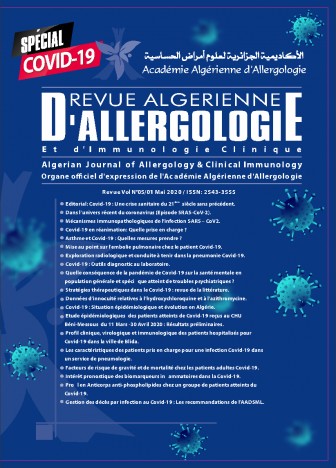REVUE ALGERIENNE D’ALLERGOLOGIE ET D'IMMUNOLGIE CLINIQUE
Volume 9, Numéro 1
23/10/2024
évaluation Des Taux De La Vitamine D Chez Un Groupe De Patients Atteints De Maladies Allergiques
Auteur :
Allam Ines
Résumé
Introduction: Vitamin D acts as a hormone and is well recognized for its role in calcium and phosphorus homeostasis and skeletal health. This hormone is also considered as immunomodulator in the immune system with a key function in infectious diseases, autoimmune diseases and allergic diseases. The aim of our study was to evaluate the levels of Vitamin D in a group of patients with allergic diseases. Patients and Methods: Our prospective study was conducted on 76 patients diagnosed with respiratory and food allergies. The mean age was 18ans years ± 7.6, and the male-to-female sex ratio was 1,53. Our study also included healthy subjects, with a mean age of 21.1 years ± 4,8, and a male-to-female sex ratio of 2. Vitamin D levels were measured using a quantitative immunoassay by chemiluminescence. Results: In our study, 93% of patients had low levels of Vitamin D with a mean of 16.3 ± 6,9 ng/ml, and 21.1 ± 6.3 ng/ml in a healthy control. Vitamin D deficiency and insufficiency were observed in 17% and 76% of our patients, respectively. Stratification of Vitamin D levels by age showed that concentrations were 16.6 ng/ml in children and 15.9 ng/ml in adults (p>0.05). Also, the mean Vitamin D levels in different allergies were as follows: 14.4 ng/ml in food allergy, 16.9 ng/ml in respiratory allergy, 18.6 ng/ml in allergic asthma, 18.8 ng/ml in latex allergy, 10.6 ng/ml in both food and respiratory allergy, and 14.5 ng/ml in bee venom allergy (p>0.05). Conclusion: Vitamin D deficiency appears to be common among the allergic patients, both children and adults. Supplementation could be recommended for these patients.
Mots clés
Vitamin D ; Allergic diseases ; Immunomodulator
